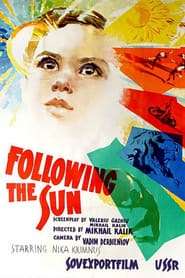Man Follows the Sun
Man Follows the Sun (Russian: Человек идёт за солнцем, translit. Chelovek idyot za solntsem) is a 1962 Soviet drama film directed by Mikhail Kalik.[1][2]
| Man Follows the Sun (Человек идёт за солнцем) | |
|---|---|
 Film poster | |
| Directed by | Mikhail Kalik |
| Written by | Valeriu Gagiu Mikhail Kalik |
| Starring | Nika Krimnus |
| Music by | Mikael Tariverdiev |
| Cinematography | Vadim Derbenyov |
| Edited by | Ksenia Blinova Nikolay Chaika |
Production company | |
Release date | 1962 |
Running time | 72 minutes |
| Country | Soviet Union |
| Language | Russian |
Plot
The film follows a little boy through the megacity (Chișinău) on his pursuit to get the sun, because, as another boy tells him that going straight he will be able to get the sun, walk around the globe, and return to the place of his departure but from a different side. The world of adults and the spaces they inhabit are viewed from a child's perspective.[2]
Cast
- Nika Krimnus as Sandu
- Yevgeniy Yevstigneyev as Nikolai Chernykh, motorcycle racer
- Tatyana Bestayeva as Elya, motorcycle racer's wife
- Anatoli Papanov as manager
- Nikolay Volkov as lottery tickets seller
- Georgiy Georgiu as Koka, hairdresser
- Valentin Zubkov as military musician
- Lev Kruglyy as truck driver
- Valentina Telegina as woman reading a letter
- Larisa Luzhina as Lenutsa
- Dumitru Fusu as Rike, inspector of Militsiya
- Maxim Grecov as Lev, shoeshiner
- Viktor Markin as happy father
- Georgios Sovchis as Prince of Orange, construction worker
- Georgiy Svetlani as fan de foot
- Iosif Levyanu as taxi driver
Reception
Administrative measures were taken against Mikhail Kalik because one brief erotic episode.[1]
gollark: <@!319753218592866315>
gollark: In general, Macron.
gollark: Yes.
gollark: ++remind 15h implementatoa0sdj
gollark: We should generalize.
References
- Peter Rollberg, George Washington University (2016). Historical Dictionary of Russian and Soviet Cinema. Rowman & Littlefield. p. 344. ISBN 9781442268425.
- Lida Oukaderova (2017). The Cinema of the Soviet Thaw: Space, Materiality, Movement. Indiana University Press. p. 102. ISBN 9780253027085.
This article is issued from Wikipedia. The text is licensed under Creative Commons - Attribution - Sharealike. Additional terms may apply for the media files.